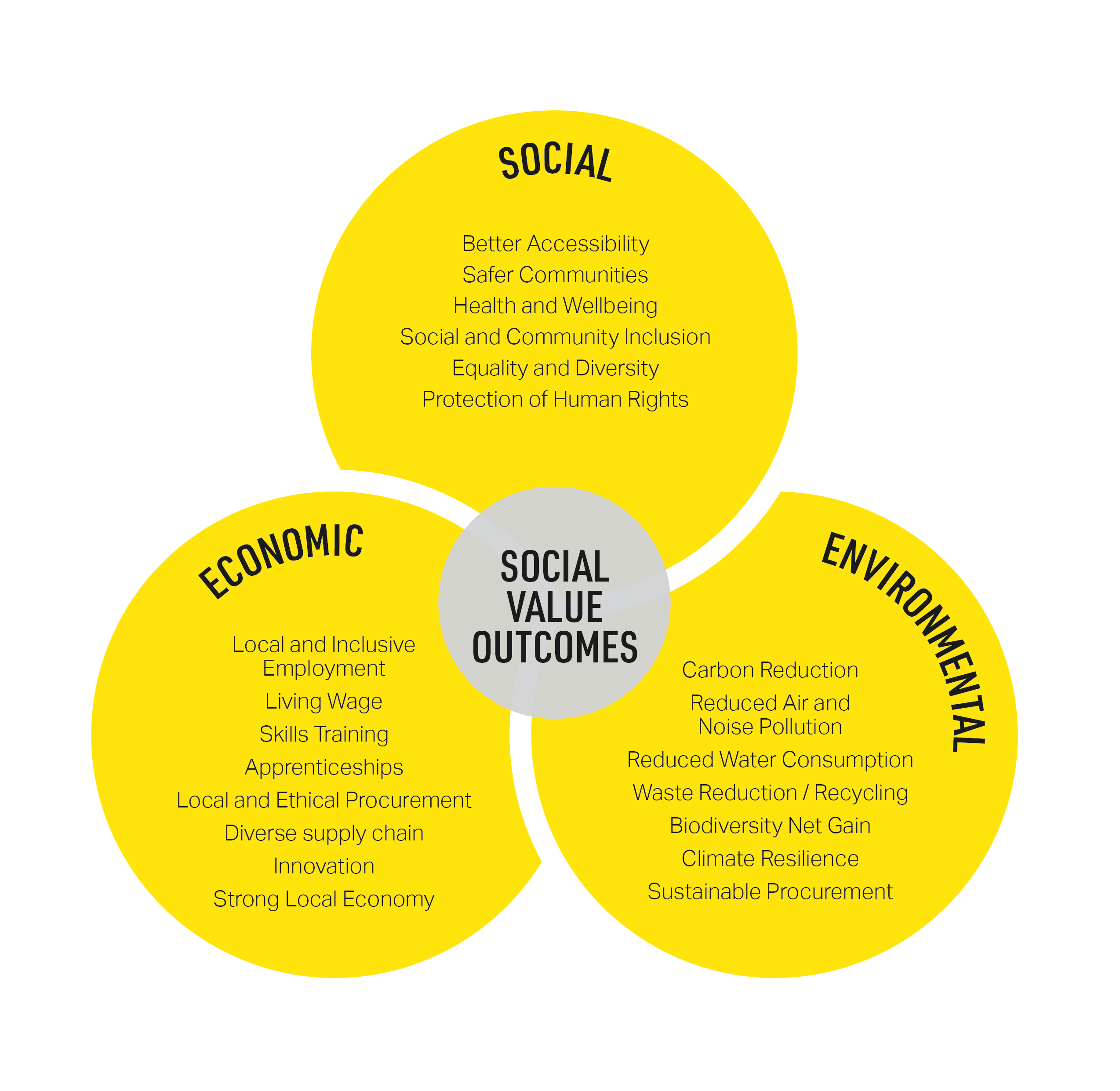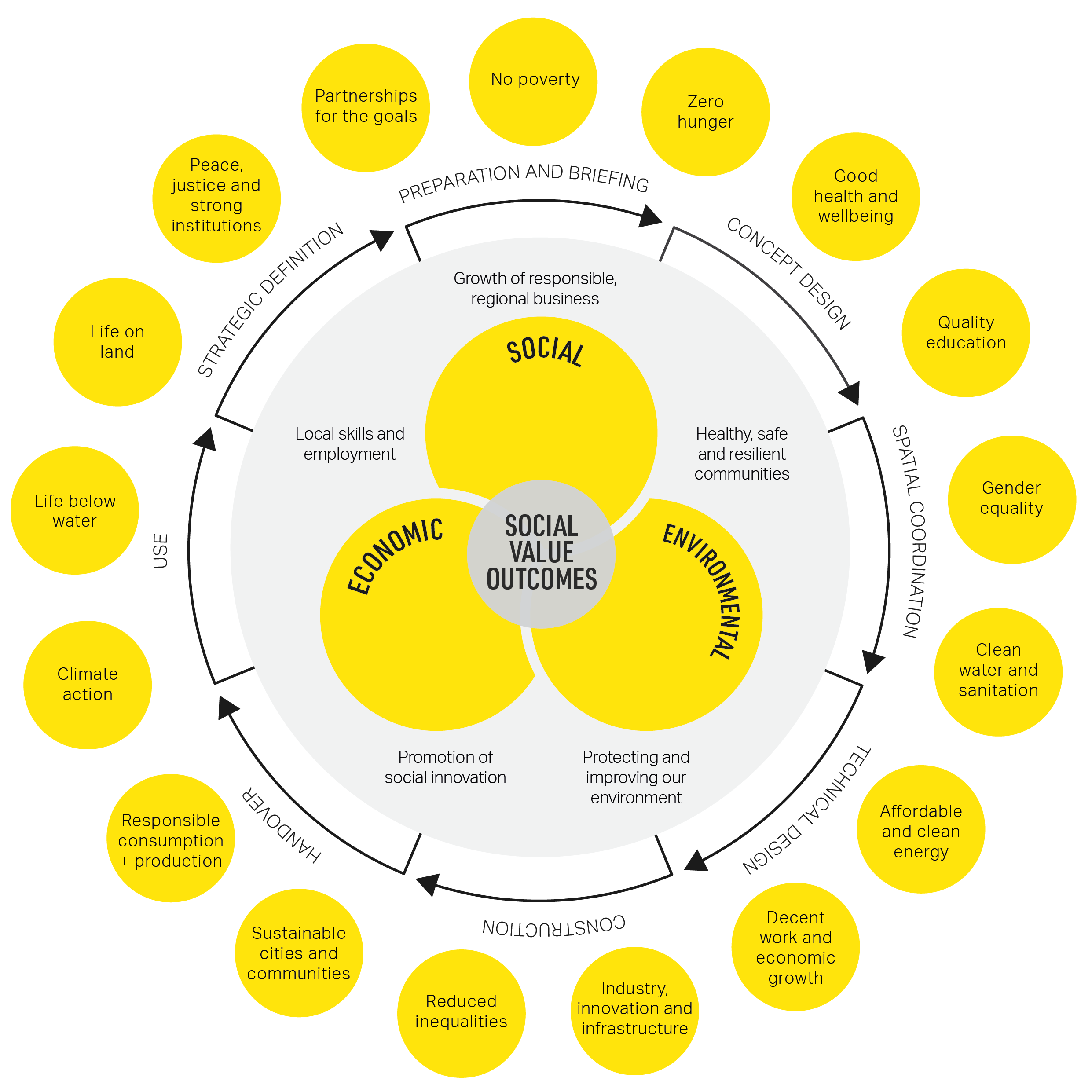Unlocking the social value of infrastructure investment
The Future of Infrastructure
There is a need to make the UK’s infrastructure more sustainable and inclusive. AECOM’s Mary Zsamboky argues that placing social value at the centre of infrastructure investment must be a priority.
The unprecedented coronavirus outbreak comes with very severe social and economic consequences. Recent economic projections by the Bank of England suggest that the coronavirus crisis could push the UK economy into its deepest recession in decades'Bank of England: Monetary Policy Report May 2020'
. Already, people on low incomes are among the hardest hit, both in terms of the health toll'Covid-19 deaths twice as high in poorest areas in England and Wales'
and the economic impact'Children's Society: How coronavirus is affecting low income families'
.
The UK government has responded with a £30 billion support package. In addition, investment in infrastructure will help provide jobs in the short-term and opportunities in the long-term. It plans to spend £640 billion on infrastructure over the next five years claiming this to be the biggest programme of public investment ever. The National Infrastructure Strategy, once published, will provide further details.
To make the most of this government programme, infrastructure investment should maximise public or ‘social’ value - that is investments that deliver the best solutions to support the public good. In practice this means including wider non-financial considerations such as community wellbeing and environmental sustainability when making the business case, and prioritising and planning projects that achieve positive social value outcomes for the public.
Social value in UK procurement and planning
Social value has risen up the political agenda since parliament passed The Public Services (Social Value) Act in 2012'Bank of England: Monetary Policy Report May 2020'
'Equivalent legislation in Wales is the ‘Well-being of Future Generations (Wales) Act 2015'
'Equivalent legislation in Scotland is the ‘Procurement Reform (Scotland) Act 2014'
. To maximise the impact of public expenditure, public bodies are required to consider whether they can secure added economic, social or environmental benefits for their local area when they are procuring services.

Figure 1: Outcomes of a social value approach
This means that social value is now a key consideration in public sector procurement decisions, and thus a factor in the way projects are planned and implemented. Much of this is being driven by local authorities and other public sector bodies who are using social value requirements in contracts to deliver greater social impact - in a context of austerity and the need to find efficiencies and deliver cost savings. As an example, Manchester City Council includes a social value element of 20 per cent in all contracts with suppliers. Bristol City Council takes 20 per cent as a starting point but also has an aim in their Social Value Policy to spend at least 40 per cent of its total procurement budget on micro, small and medium sized businesses, social enterprises and the voluntary sector.
Public authorities are also starting to explore how social value can inform development policy. Liverpool City Region Combined Authority was the first in the country to incorporate an evaluation of social value in its Spatial Development Strategy (SDS); Salford City Council requires all major developments to submit a Social Value Strategy at the planning application stage and Islington Council is promoting social value in its Local Plan 2019 by encouraging all development to deliver as many public benefits as possible. These decisions not only build on the requirements laid out in the Social Value Act 2012, they help support the strategic priorities of local authorities by building stronger communities, improving local environment outcomes, and delivering inclusive economic growth benefits.
Central government has also proposed a minimum weighting of 10 per cent of social value in its contracts. The government’s approach to delivering on this proposal is currently under review, but this highlights the continued commitment to maximise social value through public sector procurement, which accounts for about a third of all public expenditure.
Maximising the social value of infrastructure
Infrastructure investments provide multiple opportunities to deliver social value to the communities and regions where they take place. Major infrastructure projects can represent once-in-a-lifetime regeneration investments, and opportunities to enhance the employment prospects and skills of disadvantaged or marginalised members of society who might otherwise be excluded from the labour market. In rural areas, access to infrastructure can provide a lifeline to key services.
However, investment decisions are typically based on criteria that don’t take into account wider values, sometimes resulting in suboptimal commissioning decisions. For example, investment decisions for transport infrastructure tend to be made based on customer journey time savings and associated productivity increases, whilst the wider benefits such as improved health and wellbeing outcomes or any biodiversity net gains may be under-emphasised. This raises the question whether the current parameters for decision making are sufficient, particularly if transport and commuting patterns do not return to pre-coronavirus levels.
If infrastructure investments are to drive maximum returns to society, a holistic and long-term approach to infrastructure that focuses on responding to the needs of society is required. Applying a social value lens to infrastructure projects can help encourage people to think more strategically across the project lifecycle to consider how they could be planned, designed, constructed, operated, and decommissioned in a way that ensures not only economic and financial viability but also social and environmental sustainability.
Wider non-financial considerations and externalities (both positive and negative) should also be taken into account. These are often hard to measure, but they give decision-makers a fuller understanding of the long-term risks and benefits of projects under consideration.
A good way to start is to map social value outcomes against the United Nations Sustainable Development Goals (SDGs), 17 targets adopted by the General Assembly in 2015 to push the world towards a more sustainable future. That way, organisations can identify which outcomes materially contribute to the achievement of relevant SDGs, and assess where there may be other sustainable development issues that could influence value creation.

Figure 2: Integrating social value throughout the project lifecycle, demonstrating performance against the UN’s Sustainable Development Goals
Factors for successful integration
Given that social value is still emerging as an important infrastructure consideration, there are a number of challenges that could inhibit its widespread integration. Below are four ways to more fully embed social value in decision-making.
Develop a social value strategy
The social value of future infrastructure projects and programmes can be maximised by prioritising whole-life benefits for infrastructure users and wider society alongside cost considerations where feasible. An outcomes-focused strategy will set out the overarching priorities of most importance over the long-term.
Identify and prioritise local needs
It is essential to align social value with the specific needs, priorities and opportunities of the local community. Defining what social value actually means to a local area is the first step towards delivering and evidencing such value. Working with local stakeholders to deliver updates and providing opportunities to receive community feedback at all stages of an infrastructure project will greatly increase the chances of success. Mapping out the local stakeholders and engaging with them early on in the process also provides first-hand insight into the issues in the area.
Establish strong partnerships
The ability to partner with businesses and charities and tap into innovative sources of funding might allow organisations to tackle projects they could not deliver alone. The complex nature of the issues involved also means that maximising social value is best addressed through establishing strong, cross-sector, long-term partnerships where priorities are aligned. For the supply chain, this requires a willingness for greater collaboration if significant social value is to be delivered.
Measure and monitor performance
In order for the potential benefits of a social value approach to be successfully delivered, there needs to be a consistent approach to measuring, monitoring and reporting social value outcomes. It is important that the economic, social and environmental aspects are captured using key performance indicators where possible. Consistent reporting and benchmarking of social value performance will allow organisations to identify both intended and unexpected outcomes, share good practice, and identify what works best.
In the UK, the National Social Value Taskforce was set up in 2016 to encourage the effective implementation of the Social Value Act . It established a National Themes, Outcomes and Measures (TOMs) Framework for Measuring Social Value which provides a minimum reporting standard for measuring social value outcomes. Establishing a prioritised set of metrics will help indicate the extent to which these outcomes are realised.
AECOM has developed an ‘integrated capitals approach’'AECOM's Taking a capitals approach'
, which allows organisations to make better informed decisions and deliver multiple, lasting benefits to communities, beyond narrow value for money considerations. This involves taking into account the many forms of capital that enrich society. In addition to financial and built capital, they include our natural environment, our human and intellectual potential, and the strength of our social bonds and civil institutions. The approach facilitates a deeper understanding of the trade-offs that are made across the capitals in decision making and can help organisations identify where to shift resources to those activities that on balance create more social and environmental value.
Benefits of a social value approach
Integrating social value into decision making and value for money calculations has several advantages. Fundamentally, a social value approach allows organisations to balance the need to achieve value for money in their investments with a commitment to generating benefits to society and the economy whilst minimising damage to the environment. It allows commissioners to set out clear and tangible objectives in their project proposals that define positive outcomes for people, society and the planet. It encourages greater engagement with suppliers, service users and other key stakeholders at an early stage. It can lead to improved design as well as better, more efficient, and innovative delivery of projects or services. A focus on social value can also encourage a wider range of organisations to enter the public services market, providing more opportunities for projects to deliver the best outcomes for communities.
A social value approach can provide key opportunities for projects to deliver the best outcomes for households, businesses and communities and level the playing field for the most vulnerable sections of our society who are facing the biggest challenges ahead. By putting social value front and centre of decision making, stimulus spending on infrastructure can be leveraged to provide much needed employment, raise living standards, improve social wellbeing and strengthen community resilience. This will be essential if we hope to achieve sustainable economic growth and social equity in a post-coronavirus era.
-
ArticleSocial
![]()
A 'force for good'
Maximising social value when delivering public sector contracts
We gathered experts from across the public, third and private sector to discuss “What does Social Value mean for the built environment professional services industry?”A 'force for good'We gathered experts from across the public, third and private sector to discuss “What does Social Value mean for the built environment professional services industry?” -
ArticleSocial, Future
![]()
Social impact: Building a better case for infrastructure Investment
Measuring social impact
As we look towards recovery, there’s a danger that economic concerns dominate infrastructure decisions. To support those most hurt by coronavirus, social impact should be a key driver for investment.Social impact: Building a better case for infrastructure InvestmentAs we look towards recovery, there’s a danger that economic concerns dominate infrastructure decisions. To support those most hurt by coronavirus, social impact should be a key driver for investment. -
ArticleInnovation, Social, Sustainability
![]()
Sound arguments: the wonder of acoustics
When does sound become noise?
To mark the International Year of Sound 2020, we explain why it’s time to bring sound to the forefront of the conversation.Sound arguments: the wonder of acousticsTo mark the International Year of Sound 2020, we explain why it’s time to bring sound to the forefront of the conversation.






